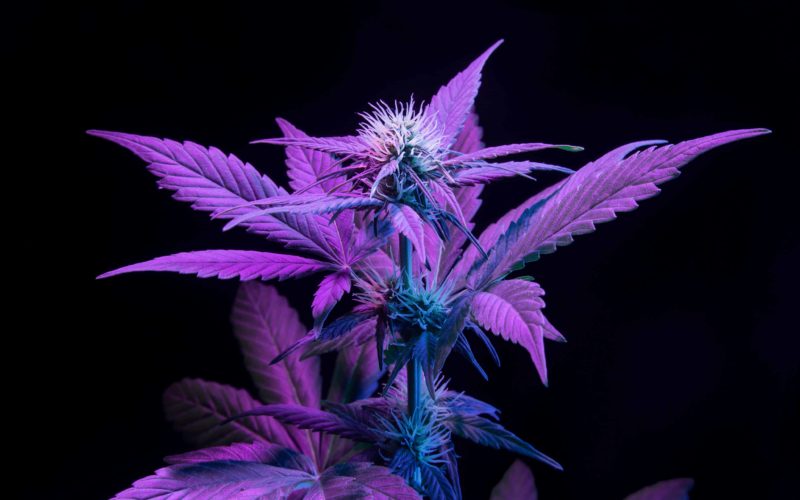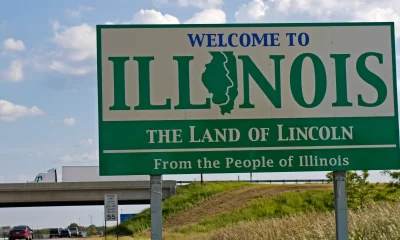Government
Legalization Campaign Kicks Off in Maryland Ahead of November Vote

The industry-backed initiative, appearing on the ballot as “Question 4,” would make Maryland the 20th state to legalize recreational cannabis.
A campaign to bring legal cannabis to Maryland officially kicked off in earnest on Thursday, as supporters look to build support ahead of this November’s vote on the initiative.
Appearing on the ballot as “Question 4,” the measure would legalize possession of cannabis for Maryland adults aged 21 and older, and also establish a regulated marijuana industry in the state.
The measure requires a simple majority to pass and, should it be approved by voters, will take effect on July 1, 2023.
“Question 4” is backed by a power player in the cannabis industry. According to The Washington Post, the campaign “relies on funding from Trulieve…an industry giant with dispensaries in eight states, including three medical locations in Maryland.” The newspaper reports that Trulieve has given $50,000 to the Question 4 campaign, which has only one other donor, Blended Public Affairs, which contributed $100 to the effort.
The chairman of the campaign is Eugene Monroe, a former offensive lineman for the Baltimore Ravens who has become a champion of cannabis reform since retiring from the NFL.
“Legalizing cannabis would stimulate Maryland’s economy and create tens of thousands of good-paying jobs, while allowing Maryland residents to benefit from vital investments in education, public health, and public safety funded by cannabis taxes,” Monroe said in a statement, as quoted by The Washington Post.
In a statement on the “Yes on 4” campaign’s official website, Monroe says that passing “Question 4 will put an end to the failed criminalization of cannabis, create a well-regulated legal marijuana market centered around equity, and open up new doors for local entrepreneurs and small business owners.”
“I hope every Marylander will vote yes on Question 4 this November,” he says.
The campaign says that the proposal will lead to the “creation of a well-regulated legal market for cannabis sales would generate tens of thousands of new jobs in Maryland, and may provide new opportunities for hundreds of local small business owners and entrepreneurs,” while also “creating new small businesses and career pathways within the cannabis industry, legalization would provide an economic boost to related industries that already provide good-paying jobs for many Marylanders, including construction, real estate, and transportation.”
The “Yes on 4” campaign also asserts that legalization is “estimated to provide the state with over $135 million in tax revenue annually,” a figure it says “doesn’t include city and county revenue or the savings from the millions of dollars Maryland spends each year enforcing marijuana possession laws.”
Lawmakers in Maryland passed a bill earlier this year that set the stage for the ballot referendum. Under the legislation that passed, as The Washington Post reported on Thursday, “if the referendum passes the state will conduct a study of the impact of marijuana on public health and a disparities study looking at the business market and what might be needed to help women- and minority-owned businesses enter the industry.”
The campaign says that the new law would create a Cannabis Business Assistance Fund “to help minority- and women-owned businesses seeking to enter the legal cannabis market” in order to “help level the playing field and ensure those in Maryland who are most often left behind get a fair shot at the economic opportunities created by marijuana legalization.”
The state’s Republican governor, Larry Hogan, did not sign the bill that passed earlier this year, which means that it would not require his signature to take effect.
Polling suggests that cannabis advocates could be in line for a big victory in Maryland come November.
A survey in March found that 62% of Marylanders support the legalization of cannabis for recreational use, while only 34% said they were opposed.
Source: https://hightimes.com/news/legalization-campaign-kicks-off-in-maryland-ahead-of-november-vote/
Business
New Mexico cannabis operator fined, loses license for alleged BioTrack fraud

New Mexico regulators fined a cannabis operator nearly $300,000 and revoked its license after the company allegedly created fake reports in the state’s traceability software.
The New Mexico Cannabis Control Division (CCD) accused marijuana manufacturer and retailer Golden Roots of 11 violations, according to Albuquerque Business First.
Golden Roots operates the The Cannabis Revolution Dispensary.
The majority of the violations are related to the Albuquerque company’s improper use of BioTrack, which has been New Mexico’s track-and-trace vendor since 2015.
The CCD alleges Golden Roots reported marijuana production only two months after it had received its vertically integrated license, according to Albuquerque Business First.
Because cannabis takes longer than two months to be cultivated, the CCD was suspicious of the report.
After inspecting the company’s premises, the CCD alleged Golden Roots reported cultivation, transportation and sales in BioTrack but wasn’t able to provide officers who inspected the site evidence that the operator was cultivating cannabis.
In April, the CCD revoked Golden Roots’ license and issued a $10,000 fine, according to the news outlet.
The company requested a hearing, which the regulator scheduled for Sept. 1.
At the hearing, the CCD testified that the company’s dried-cannabis weights in BioTrack were suspicious because they didn’t seem to accurately reflect how much weight marijuana loses as it dries.
Company employees also poorly accounted for why they were making adjustments in the system of up to 24 pounds of cannabis, making comments such as “bad” or “mistake” in the software, Albuquerque Business First reported.
Golden Roots was fined $298,972.05 – the amount regulators allege the company made selling products that weren’t properly accounted for in BioTrack.
The CCD has been cracking down on cannabis operators accused of selling products procured from out-of-state or not grown legally:
- Regulators alleged in August that Albuquerque dispensary Sawmill Sweet Leaf sold out-of-state products and didn’t have a license for extraction.
- Paradise Exotics Distro lost its license in July after regulators alleged the company sold products made in California.
Golden Roots was the first alleged rulebreaker in New Mexico to be asked to pay a large fine.
Source: https://mjbizdaily.com/new-mexico-cannabis-operator-fined-loses-license-for-alleged-biotrack-fraud/
Business
Marijuana companies suing US attorney general in federal prohibition challenge

Four marijuana companies, including a multistate operator, have filed a lawsuit against U.S. Attorney General Merrick Garland in which they allege the federal MJ prohibition under the Controlled Substances Act is no longer constitutional.
According to the complaint, filed Thursday in U.S. District Court in Massachusetts, retailer Canna Provisions, Treevit delivery service CEO Gyasi Sellers, cultivator Wiseacre Farm and MSO Verano Holdings Corp. are all harmed by “the federal government’s unconstitutional ban on cultivating, manufacturing, distributing, or possessing intrastate marijuana.”
Verano is headquartered in Chicago but has operations in Massachusetts; the other three operators are based in Massachusetts.
The lawsuit seeks a ruling that the “Controlled Substances Act is unconstitutional as applied to the intrastate cultivation, manufacture, possession, and distribution of marijuana pursuant to state law.”
The companies want the case to go before the U.S. Supreme Court.
They hired prominent law firm Boies Schiller Flexner to represent them.
The New York-based firm’s principal is David Boies, whose former clients include Microsoft, former presidential candidate Al Gore and Elizabeth Holmes’ disgraced startup Theranos.
Similar challenges to the federal Controlled Substances Act (CSA) have failed.
One such challenge led to a landmark Supreme Court decision in 2005.
In Gonzalez vs. Raich, the highest court in the United States ruled in a 6-3 decision that the commerce clause of the U.S. Constitution gave Congress the power to outlaw marijuana federally, even though state laws allow the cultivation and sale of cannabis.
In the 18 years since that ruling, 23 states and the District of Columbia have legalized adult-use marijuana and the federal government has allowed a multibillion-dollar cannabis industry to thrive.
Since both Congress and the U.S. Department of Justice, currently headed by Garland, have declined to intervene in state-licensed marijuana markets, the key facts that led to the Supreme Court’s 2005 ruling “no longer apply,” Boies said in a statement Thursday.
“The Supreme Court has since made clear that the federal government lacks the authority to regulate purely intrastate commerce,” Boies said.
“Moreover, the facts on which those precedents are based are no longer true.”
Verano President Darren Weiss said in a statement the company is “prepared to bring this case all the way to the Supreme Court in order to align federal law with how Congress has acted for years.”
While the Biden administration’s push to reschedule marijuana would help solve marijuana operators’ federal tax woes, neither rescheduling nor modest Congressional reforms such as the SAFER Banking Act “solve the fundamental issue,” Weiss added.
“The application of the CSA to lawful state-run cannabis business is an unconstitutional overreach on state sovereignty that has led to decades of harm, failed businesses, lost jobs, and unsafe working conditions.”
Business
Alabama to make another attempt Dec. 1 to award medical cannabis licenses

Alabama regulators are targeting Dec. 1 to award the first batch of medical cannabis business licenses after the agency’s first two attempts were scrapped because of scoring errors and litigation.
The first licenses will be awarded to individual cultivators, delivery providers, processors, dispensaries and state testing labs, according to the Alabama Medical Cannabis Commission (AMCC).
Then, on Dec. 12, the AMCC will award licenses for vertically integrated operations, a designation set primarily for multistate operators.
Licenses are expected to be handed out 28 days after they have been awarded, so MMJ production could begin in early January, according to the Alabama Daily News.
That means MMJ products could be available for patients around early March, an AMCC spokesperson told the media outlet.
Regulators initially awarded 21 business licenses in June, only to void them after applicants alleged inconsistencies with how the applications were scored.
Then, in August, the state awarded 24 different licenses – 19 went to June recipients – only to reverse themselves again and scratch those licenses after spurned applicants filed lawsuits.
A state judge dismissed a lawsuit filed by Chicago-based MSO Verano Holdings Corp., but another lawsuit is pending.
Source: https://mjbizdaily.com/alabama-plans-to-award-medical-cannabis-licenses-dec-1/
-

 Business2 years ago
Business2 years agoPot Odor Does Not Justify Probable Cause for Vehicle Searches, Minnesota Court Affirms
-

 Business2 years ago
Business2 years agoNew Mexico cannabis operator fined, loses license for alleged BioTrack fraud
-

 Business2 years ago
Business2 years agoAlabama to make another attempt Dec. 1 to award medical cannabis licenses
-

 Business2 years ago
Business2 years agoWashington State Pays Out $9.4 Million in Refunds Relating to Drug Convictions
-

 Business2 years ago
Business2 years agoMarijuana companies suing US attorney general in federal prohibition challenge
-

 Business2 years ago
Business2 years agoLegal Marijuana Handed A Nothing Burger From NY State
-

 Business2 years ago
Business2 years agoCan Cannabis Help Seasonal Depression
-

 Blogs2 years ago
Blogs2 years agoCannabis Art Is Flourishing On Etsy













